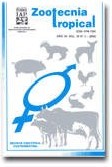
|
Zootecnia Tropical
Instituto Nacional de Investigaciones Agrícolas Venezuela
ISSN: 0798-7269
Vol. 25, No. 1, 2007, pp. 1-7
|
 Bioline Code: zt07001
Bioline Code: zt07001
Full paper language: Spanish
Document type: Research Article
Document available free of charge
|
|
|
Zootecnia Tropical, Vol. 25, No. 1, 2007, pp. 1-7
| es |
Influencias ambientales y heredabilidad para características de crecimientoen ganado Sardo Negro en México
Martínez-González, Juan Carlos; Castillo-Rodríguez, Sonia Patricia; Lucero-Magaña, Froylán Andrés & Ortega-Rivas, Eligio
Resumen
Los objetivos de este estudio fueron evaluar el efecto de algunos factores ambientales en el peso al nacimiento (PN), peso ajustado a 205 (P205), 365 (P365) y 550 días (P550) y ganancia diaria predestete (GDP), así como estimar la heredabilidad (h2) para esas características en animales Sardo Negro. Se utilizó la información generada de 1997 a 2005 en ranchos ubicados en México. Los ranchos se dedican a la cría de ganado Sardo Negro de registro y pertenecían a la Asociación Mexicana de Criadores de Cebú. Los modelos estadísticos incluyeron los efectos fijos de hato, año y época de nacimiento del animal (Seca y Lluviosa) y sexo (Macho o Hembra) y el efecto aleatorio del residual. El modelo para estimar la h2 directa incluyó el efecto fijo de grupo contemporáneo (criador-año-época-sexo) y el efecto aleatorio aditivo directo. Los análisis se realizaron mediante los procedimientos de modelos lineales generales y máxima verosimilitud restringida libre de derivadas. Los promedios para PN, P205, P365, P550 y GDP fueron 32,9 185,1 281,4 384,9 y 0,742 kg, respectivamente. Las h2 para efectos directos fueron 0,00 0,27 0,26 0,12 y 0,27 para PN, PD, P365, P550 y GDP, respectivamente. Los resultados de este estudio demuestran que los efectos ambientales son fuentes de variación relativamente importantes para P205, P365 y GDP. Las altas h2 estimadas indican que es factible mejorar el crecimiento del ganado Sardo Negro a través de la selección.
Palabras-clave
Sardo Negro, crecimiento, heredabilidad, ganado de registro.
|
| |
| en |
Environmental effects and heritability for growth traits in Sardo Negro cattle from Mexico
Martínez-González, Juan Carlos; Castillo-Rodríguez, Sonia Patricia; Lucero-Magaña, Froylán Andrés & Ortega-Rivas, Eligio
Abstract
Information on Sardo Negro cattle obtained from 1997 to 2005, from breeding herds, from the Mexican Association of Zebu Breeders, localized in herds of Mexico was used. The objectives of the study were to evaluate the effect of several environmental factors on birth weight (BW), weight adjusted to 205 (W205), 365 (W365), and 550 days of age (W550), and pre-weaning daily weight gain (DWG) and to estimate heritability (h2) for those traits. The statistical models included the fixed effects of herd, year and season of birth (dry and rainy) and sex of the calf (male or female). The model to estimate the h2 included the fixed effect of contemporary group (herd-year-season-sex) and the direct additive random effect. Analyses were carried out using general linear models and multiple traits derivative-free restricted maximum likelihood procedures. Means for BW, W205, W365, W550, and DWG were 32.9 ± 1.5, 185.1 ± 34.8, 281.4 ± 50.1, 384.9 ± 58.5 y 0.742 ± 0.170 kg, respectively. Heritability estimates for BW, W205, W365, W550, and DWG were 0.00 ± 0.08, 0.27 ± 0.14, 0.26 ± 0.13, 0.12 ± 0.19 y 0.27 ± 0.14, respectively. The results of this study show that environmental factors are important sources of variation for W205, W365, and DWG. The high h2 estimates indicates that it is possible to improve the growth of Sardo Negro cattle by selection.
Keywords
Sardo Negro, growth traits, heritability, registered cattle.
|
| |
© Copyright 2007 - Zootecnia Tropical
Alternative site location: http://www.sian.inia.gob.ve/repositorio/revistas_ci/ZootecniaTropical/ztindice.htm
|
|
